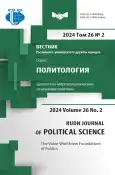Instruments of State Identity Policy in the Contemporary World
- Authors: Popova O.V.1,2, Grishin N.V.1,2
-
Affiliations:
- Institute of Scientific Information for Social Sciences of the Russian Academy of Sciences
- Saint Petersburg University
- Issue: Vol 26, No 2 (2024): The Value-Worldview Foundations of Politics
- Pages: 325-340
- Section: POLITICAL IDENTITY AND IDENTITY POLICIES: SEMANTIC FOUNDATIONS AND IMPLEMENTATION TOOLS
- URL: https://journal-vniispk.ru/2313-1438/article/view/322434
- DOI: https://doi.org/10.22363/2313-1438-2024-26-2-325-340
- EDN: https://elibrary.ru/MTHIHC
- ID: 322434
Cite item
Abstract
The article is devoted to studying the development and specifics of using instruments of state identity policy in modern conditions of geopolitical challenges. The study contributes to clarifying scientific knowledge about the means by which state authorities strive to achieve their goals in identity construction. The differentiation of approaches among particular states in the conditions of modern geopolitical confrontation has been established. The study is based on the application of a comprehensive approach to determining the content of state identity policy. The empirical source of the study is the results of an expert survey of leading domestic researchers in the field of identity politics conducted in the fall of 2023 with the participation of the authors. Discourse analysis was used as a method for processing primary data. The main trends in the development of instruments of state identity policy in the conditions of the 2020s have been identified. The study allows for the clarification of knowledge about the limitations and limits of the effectiveness of the state in the field of identity construction.
About the authors
Olga V. Popova
Institute of Scientific Information for Social Sciences of the Russian Academy of Sciences; Saint Petersburg University
Author for correspondence.
Email: pov_64@mail.ru
ORCID iD: 0000-0002-0701-7767
Dr. Sci. (Pol. Sci.), Senior Research Fellow, Institute of Scientific Information for Social Sciences of the Russian Academy of Sciences; Professor, the Head of the Department of Political Institutes and Applied Political Studies, St. Petersburg State University
Moscow, Russian Federation; Saint Petersburg, Russian FederationNikolay V. Grishin
Institute of Scientific Information for Social Sciences of the Russian Academy of Sciences; Saint Petersburg University
Email: nvgrishin@mail.ru
ORCID iD: 0000-0002-0850-7581
Dr. Sci. (Pol. Sci.), Leading Research Fellow, Institute of Scientific Information for Social Sciences of the Russian Academy of Sciences; Professor of the Department of Political Institutions and Applied Political Studies, Saint Petersburg State University
Moscow, Russian Federation; Saint Petersburg, Russian FederationReferences
- Avksentyev, V.A. (2018). Deconstruction of Russian identity in news announcements of electronic media. Scientific Thought of the Caucasus, 4, 37–43. https://doi.org/10.18522/2072-01812018-96-4-37-43 (In Russian).
- Baranov, A.V. (2023). Sociocultural integration of Russian society under the influence of the Ukrainian crisis of 2013–2022 and tasks of identity politics. Management Consulting, 1, 10–23. (In Russian).
- Baranov, N.A. (2019). The crimean factor in the formation of all-Russian civic identity. Caspian Region: Politics, Economics, Culture, 3, 59–65. https://doi.org/10.21672/1818510X-2019-60-3-059-065 (In Russian).
- Gorlova, I.I., & Zorin, A.I. (2023). Formation and strengthening of all-Russian identity and civil unity as priority directions of modern state policy of the Russian Federation. Social and Humanitarian Knowledge, 2, 5–9. (In Russian).
- Gorshkov, M.K. (2016). The role of the state in preserving and developing national and civic identity and strengthening trust in the context of global processes. Humanitarian of the South of Russia, 3, 11–25. (In Russian).
- Grishin, N.V. (2019). The state as a subject of identity formation policy. Caspian Region: Politics, Economics, Culture, 3, 66–72. (In Russian). https://doi.org/10.21672/1818-510X-2019-60-3-066-072
- Grishin, N.V. (2020). The state identity politics: a new bet in the political struggle? Tomsk State University Journal of Philosophy, Sociology and Political Science, 55, 231–239. (In Russian). https://doi.org/10.17223/1998863Х/55/23
- Gutsalov, A.A. (2023). Objective indicators of the success of the policy of national identity. Cultural heritage of the North Caucasus as a Resource of Interethnic Harmony. Ed. by I.I. Gorlova. Moscow, 265–283. (In Russian).
- Hood, c., & Margetts, H. (2007). The Tools of Government in the Digital Age. Basingstoke: Palgrave.
- lagutin, O.V. (2019). Principles of state policy for identity formation in modern Russia. Conflictology, 3, 44–55. (In Russian).
- lascoumes, P., & Patrick, G. (2007). Introduction: Understanding Public Policy through Its Instruments. Governance, 20(1), 1–27. https://doi.org/10.1111/j.1468-0491.2007.00342.x
- Lubsky, A.V. (2018). Projects for constructing national identity in modern Russia. Humanitarian of the South of Russia, 7(1), 48–64. (In Russian).
- Malinova, O.yu. (2017). Identity politics as a struggle for meaning: problems of conceptualization. Symbolic Politics. Vol. 5. M.: RAS INION, 7–20. (In Russian).
- Mitroshenkov, O.A. (2016). Identity: from theoretical concept to managerial influences. Power, 24(2), 14–28. (In Russian).
- Popova, O.V. (2019). Identity Policy at National level as a Theoretical construct and Real Practice: Expert Assessments Attempt. South-Russian Journal of Social Sciences, 20(4), 74–91. https://doi.org/10.31429/26190567-20-4-74-91. (In Russian).
- Popova, O.V. (2020). Unresolved problems in the theory of state identity policy in Russian political science. Political Science, 4, 86–110. https://doi.org/10.31249/poln/2020.04.05 (In Russian).
- Salamon, l. (2002). The Tools of Government: A Guide to the New Governance. New york: Oxford University Press.
- Titov, V.V. (2022). State identity policy in the Russian Federation: the problem of institutional organization. Issues of Political Science, 12(7), 2261–2268. (In Russian).
- Welfens, P. (2002). Fundamentals of economic policy. St. Petersburg: Publishing house “Dmitry Bulanin”. Grundlagen der Wirtschaftspolitik [Basics of economic policy]. Berlin, Heidelberg: Springer-Verlag]
- Zorin, V.yu., & Rudakov, A.V. (2018). Identity politics as a factor in ensuring sovereignty in the context of globalization. Bulletin of the Moscow State Regional University, 3, 55–70. (In Russian).
Supplementary files









